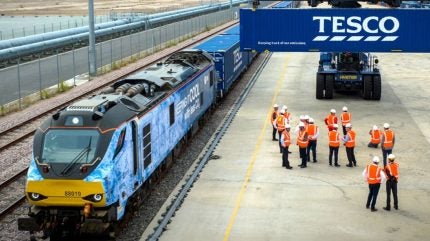
Tesco, one of the UK’s leading retailers, has further strengthened its commitment to sustainability by expanding its rail network.
The company has introduced a tenth rail service, marking a significant milestone in its efforts to reduce the environmental impact of its supply chain.
The new service, operating between Daventry and Widnes, will transport more than 600,000 cases of goods per week, replacing approximately 90 lorry journeys.
This transition is expected to result in an annual reduction of over 6,000 tonnes of carbon dioxide equivalent.
With the addition of this service, Tesco said its rail network now moves more than 300 million cases of goods annually.
The retailer’s ambitious plans involve increasing this figure to over seven million cases per week during peak periods.

US Tariffs are shifting - will you react or anticipate?
Don’t let policy changes catch you off guard. Stay proactive with real-time data and expert analysis.
By GlobalDataThe latest rail service, in partnership with DRS and Maritime, will extend Tesco’s rail reach to more stores across the UK.
By delivering products closer to their final destination, Tesco aims to optimise the efficiency of its distribution network and minimise road transport emissions.
“Tesco’s distribution network is one of the most extensive in the UK and plays an important role in our efforts to become carbon neutral in our own operations by 2035,” said Ken Murphy, Tesco Group CEO.
“Switching from road to rail allows us to get products to our stores in a more sustainable way, by removing thousands of lorry journeys each year and reducing our carbon emissions.”
“Tesco’s largest service to date underlines the strategic role of our rail facility in Manchester as a hub for British trade, uniquely placed to offer fast, efficient, low-carbon logistics for both international and domestic cargo,” said John Williams, executive chair of Maritime Group.
Beyond expanding its rail network, Tesco said it is also taking steps to optimise its road transport operations.
Initiatives such as double-decker trailers and collaborative supplier planning have contributed to reductions in truck journeys and emissions.



